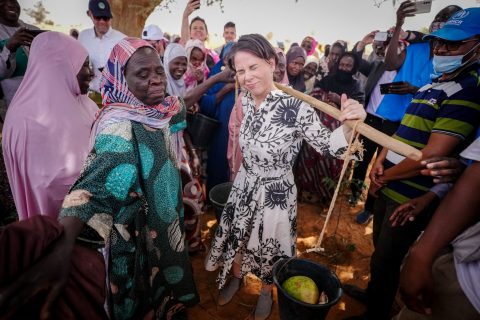Germany Urges International Community To Help Fight Against Hunger In Africa
African News, Latest Headlines, News Around Africa Saturday, April 16th, 2022
(AFRICAN EXAMINER) – The German government called on countries around the world to help keep people in parts of Africa from going hungry as a result of rapidly rising food prices and climate change.
German Foreign Minister Annalena Baerbock gave the charge during a visit to the Ouallam refugee camp in Niger Republic.
A former French colony, Niger is one of the poorest countries in the world and is ranked last out of 189 countries in the Human Development Index of the United Nations Development Programme (UNDP).
The minister said faster increases in food prices which is partly as a result of the war in Ukraine, are exacerbating crises that already existed in West Africa,
“We see and hear you and have a responsibility to somehow bring this hurricane of crises under control. As industrialized nations, we have to significantly increase international help in order to avoid a hunger crisis here”, she said.
Baerbock is continuing her West Africa trip in Niger after stopping in Mali to discuss the German military mission there. She is expected to meet Foreign Minister Hassoumi Massoudou and President Mohamed Bazoum in the capital, Niamey.
Prices of food, energy, and fertilizer have risen sharply, with increasing risks of global instability, given that Russia and Ukraine are among the world’s breadbaskets.
Russia and Ukraine provide around 30 percent of the world’s wheat and barley, one-fifth of its maize, and over half of its sunflower oil. At the same time, Russia is the world’s top natural gas exporter, and second-largest oil exporter. Russia and its neighbor Belarus export around one-fifth of the world’s fertilizers.
In its recent report, United Nations (UN) report has found that more than 70 percent of Africa’s economies are at severe risk from Russia’s war in Ukraine.
Meanwhile, the African Development Bank (AfDB) is one of several international organizations, including UN specialized agencies and development lenders that are considering a plan to boost food production in Africa and avert a heavy toll on the African continent.
UN Secretary-General Antonio Guterres announced the establishment of the 32-member UN Global Crisis Response Group, which he chaired in March. Its members are the heads of the various organizations. Its first brief, released on Wednesday in New York, found that 41 African countries face maximum exposure to at least one emergency caused by the war.
“The war is supercharging a three-dimensional crisis – food, energy and finance, that is pummeling some of the world’s most vulnerable people, countries and economies.
“We need really to have a sense of urgency – restrictions need to be abolished, there should be no hoarding of any of these products and most importantly, we need to use immediately the financial instruments available”, Guterres warned at a virtual press conference.
The Global Crisis Response Group will help decision-makers around the world mobilize solutions and develop strategies and recommendations to help all countries, including the most vulnerable—weather the interlinked crises.
Preliminary analysis suggests that as many as 1.7 billion people in 107 economies are exposed to at least one of the three risks highlighted by the Global Crisis Response Group.
The UN report calls for immediate and efficient use of all existing mechanisms to help countries directly suffering from the war and its consequences.
Guterres said action plans recommended by Global Crisis Response Group target Africa particularly. African countries are among the most vulnerable to the looming crisis.
African Development Bank Group President Dr. Akinwumi Adesina said the emergency food plan would build on the success of existing programs, such as the African Development Bank’s Technologies for African Agricultural Transformation (TAAT) initiative. Meanwhile, TAAT has provided 11 million farmers across 29 African countries with such technologies as drought-resistant maize, heat-resistant wheat, and higher-yielding seed varieties.
Adesina said the AfDB’s plan could help 40 million farmers increase their harvests of heat-tolerant wheat varieties, rice, soybean and other crops to feed about 200 million people.
“If ever there was a time to drastically raise food production in Africa, it is now”, he added.
During Wednesday’s briefing, the UN Chief announced the appointment of six heads of state as global champions to drive global advocacy and foster the needed political will to spur action.
They include President Macky Sall of Senegal, who currently chairs the African Union; Danish Prime Minister Mette Frederiksen; President Joko Widodo of Indonesia; German Chancellor Olaf Scholz; Prime Minister Mia Mottley of Barbados; and Prime Minister Sheikh Hasina of Bangladesh
Related Posts
Short URL: https://www.africanexaminer.com/?p=75822






















